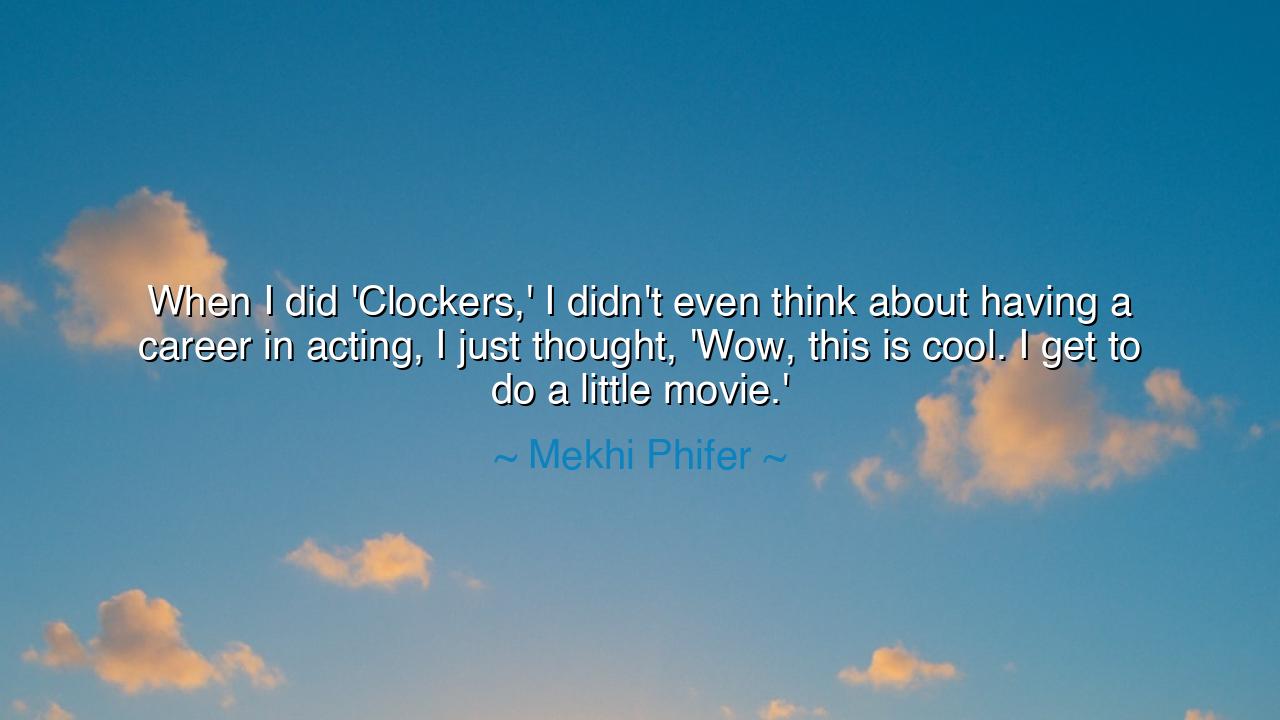
When I did 'Clockers,' I didn't even think about having a career
When I did 'Clockers,' I didn't even think about having a career in acting, I just thought, 'Wow, this is cool. I get to do a little movie.'






"When I did 'Clockers,' I didn't even think about having a career in acting, I just thought, 'Wow, this is cool. I get to do a little movie.'" These words, spoken by Mekhi Phifer, reflect a profound truth about the nature of passion, opportunity, and the unexpected paths life can take. Phifer’s statement speaks not to a calculated career or a preordained path, but to the sheer joy and excitement of seizing an opportunity when it arises. His experience is a testament to the power of embracing the present moment and engaging with the work at hand without the pressure of future expectations. Sometimes, it is not the grand ambitions or carefully constructed plans that lead to success, but rather the simple enthusiasm and openness to the opportunities that come our way.
In ancient times, the great warriors and philosophers often spoke of the importance of embracing the present. Socrates, in his dialogues, urged individuals to focus not on the external measures of success, but on the pursuit of truth and virtue in the moment. He believed that the purpose of life was not to chase after fame or recognition, but to live authentically, guided by wisdom and self-awareness. Phifer’s reflection echoes this sentiment—he did not enter acting with thoughts of career advancement or fame, but simply with a sense of excitement about the work itself. His experience reminds us that joy and fulfillment can often arise from pursuing something without being burdened by expectations of what it should lead to.
Consider the example of Leonardo da Vinci, whose many talents spanned beyond painting to engineering, anatomy, and invention. Da Vinci did not set out with a singular career in mind; rather, he followed his passions wherever they led him. His famous works, like the Mona Lisa, were born from a deep curiosity about the world and an unwillingness to be confined by conventional career paths or roles. Like Phifer, da Vinci was not driven by a desire for external validation but by the joy of creating and exploring. It was through his open-mindedness and curiosity that he became one of history’s greatest polymaths.
Phifer’s words also point to the profound importance of opportunity in shaping our lives. When he was offered the role in Clockers, he did not view it as a stepping stone to a grand career, but as a unique chance to engage with something new. This willingness to embrace the present opportunity without the pressure of knowing what would come next is a powerful lesson. Opportunity is often fleeting, and it is through embracing it fully, without overthinking or overanalyzing its implications, that we open ourselves to unexpected growth. Had Phifer approached the film with hesitation or doubt, he might have missed the chance to be part of a defining project in his career.
This brings us to the ancient wisdom of action. The Tao Te Ching, an ancient Chinese text, speaks of the way of the Tao, or the way of effortless action—acting in harmony with the flow of life. Laozi, its author, teaches that greatness arises not from forceful striving but from being in tune with the present moment, responding naturally and effortlessly to the opportunities life presents. Mekhi Phifer’s response to the chance to act in Clockers mirrors this philosophy. He did not force his way into a career or obsess over the future. He simply acted in the present, with enthusiasm, and let the opportunities unfold before him.
The lesson here is clear: embrace the present. Like Mekhi Phifer and the great artists and philosophers who came before him, we must learn to act with joy and authenticity in whatever we do, free from the pressure of expectations. The true measure of success is not found in the carefully planned trajectory of our careers or lives, but in the enthusiasm with which we engage with the opportunities that come our way. Success is often a byproduct of being present in the moment, of allowing ourselves to explore what excites us, rather than rigidly following a prescribed path.
In practical terms, this means stepping away from the desire to control every aspect of our lives and learning to be open to the unknown. Whether in career, relationships, or personal growth, we must give ourselves the freedom to pursue what excites us, without the burden of needing it to lead to something else. Like Socrates, Da Vinci, and Phifer, we should focus on what we can do in the present, with passion and authenticity, and allow the future to unfold in its own time. Opportunity will find us when we are open, curious, and willing to take the first step, regardless of where it might lead.
Finally, let us remember that true success is not about climbing a ladder, but about the joy of creating, learning, and growing through every step we take. Mekhi Phifer reminds us that when we engage with life as it is, without forcing or over-planning, we can find fulfillment in even the most unexpected places. Be present, take action with enthusiasm, and trust that the future will reveal itself in the most beautiful and surprising ways. Let us, like Phifer, approach life with a sense of wonder and openness, and in doing so, we will not only find success but the deeper meaning that comes from living authentically.






AAdministratorAdministrator
Welcome, honored guests. Please leave a comment, we will respond soon